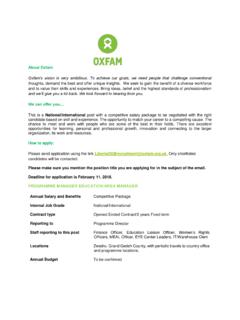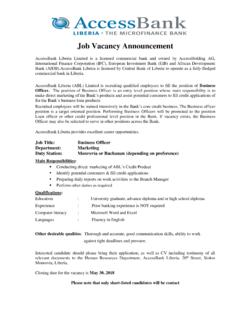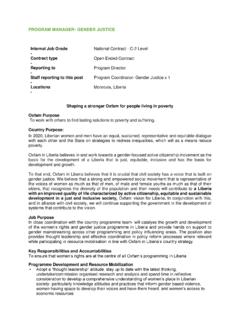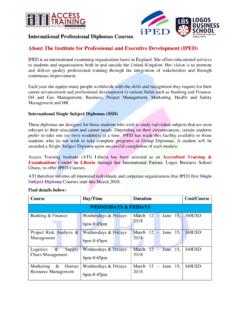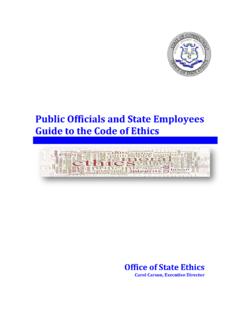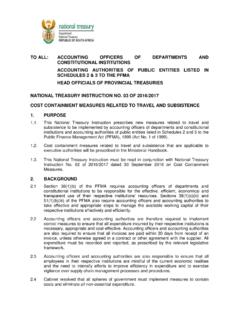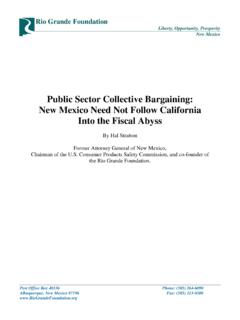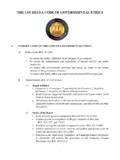Transcription of AN ACT OF LEGISLATURE PRESCRIBING A …
1 AN ACT OF LEGISLATURE PRESCRIBING . A NATIONAL code OF conduct . FOR ALL public officials AND EMPLOYEES. OF THE GOVERNMENT OF THE REPUBLIC OF LIBERIA. PART I: PRELIMINARY. SECTION : PREAMBLE. Whereas, Chapter 11, Article 90 of the 1986 Constitution of Liberia stipulates the following provisions: a) No person, whether elected or appointed to any public office, shall engage in any other activity which shall be against public policy, or constitute conflict of interest. b) No person holding public office shall demand and receive any other perquisites, emoluments or benefits, directly or indirectly, on account of any duty required by Government. c) The LEGISLATURE shall, in pursuance of the above provision, prescribe a code of conduct for all public officials and employees; stipulating the acts which constitute conflict of interest or are against public policy, and the penalties for violation thereof.
2 Whereas, the essence of governance is the integrity of the public service, as delivered and rendered by public officials and Employees of Government; and since their activities account for a majority of the work of government and have extensive influence over the lives of the people;. Whereas, in view of the role and influence of public officials and Employees of Government, it is expected that these persons exhibit high moral character and integrity; be law-abiding and committed persons who show proper care for public assets, behave ethically and discharge his or her duties and responsibilities impartially, efficiently and effectively with diligence and dignity;. Whereas, the high degree of integrity expected of public officials and Employees of Government is outlined in Article 90(c) of the 1986 Constitution of the Republic of Liberia, which provides that The LEGISLATURE shall, in pursuance of the above provision, prescribe a code of conduct for all public officials and employees, stipulating the acts which constitute conflict of interest or are against public policy, and the penalties for violation thereof.
3 ;. Whereas, this code of conduct has been developed pursuant to both this constitutional requirement and the tenets of Good Governance for the creation of a diligent and disciplined corps of public officials and Employees of Government;. Whereas, the purpose of the code of conduct is, to set out standards of behavior, and conduct required of public officials and Employees of Government, it shall guide, regulate and ensure 1. compliance with the norms and behaviors required of all public officials and Employees of Government. It is designed and shall be implemented, to ensure impartiality, objectivity, transparency, integrity, efficiency and effectiveness in the performance of their duties and mandates. NOW, THEREFORE, IT IS HEREBY ENACTED BY THE SENATE AND HOUSE OF. REPRESENTATIVES OF THE REPUBLIC OF LIBERIA, IN LEGISLATURE ASSEMBLED: SECTION SHORT TITLE. This Act may be cited as the code of conduct of 2014.
4 SECTION INTERPRETATION. In this code , unless the context otherwise requires, the following words and phrases shall have the meaning(s) ascribed to them in this Section. Assets: refer to movable and/or immovable property, including cash and investments. Bribery: means any reward or inducement paid to a public Official or employee of Government for doing or forbearing to do anything in respect of any matter or transaction within the scope of their official duties. It is anything promised, offered, given, accepted or received by a public Official and employee of Government for or on account of favor given or to be given in the exercise of his or her official duties, and includes what is known widely in local terminology as cold water or eating . A person has committed bribery if: (a) he or she directly or indirectly promises, offers, or gives a benefit or reward to a public official or one who occupies any position of trust in any public or private entity in order that the official, person or entity acts or refrains from acting in the exercise of his or her official duties in violation of the trust reposed in him or her; or (b) he or she directly or indirectly solicits or accepts any undue advantage for himself or herself or for another person or entity, in order that he or she or the other person or entity acts or refrains from acting in the exercise of his or her official duties, in violation of the trust reposed in him or her by virtue of his or her office.
5 Casual Gifts: any unsolicited present or gift, of a modest scale given to a public Official or employee of Government which is not connected to their official duties, which does not exceed US$ in value. This provision shall not apply to gifts given during cultural and customary celebrations. 2. code : Means the code of conduct for all public officials and Employees of the Government of the Republic of Liberia. conduct : means any behavior, action or inaction exhibited by public officials and Government Employees within and outside the work environment. Conflict of Interest: is when a public official, contrary to official obligations and duties to act for the benefit of the public , exploits a relationship for personal benefit. Covered Executive Branch Official: means the President and designated staff of the Office of the President, and the Vice President and designated staff of the Office of the Vice President.
6 Covered Legislative Branch Official: means a member of either House of the LEGISLATURE , any employee of, or any other individual functioning in the capacity as an employee in the Legislative Branch. This includes committee members, leadership staff, and administrative staff. employee of Government: means a person working in Government, whose duty it is to render service under the direction of a public Official or head of a department. Employer: means the Government of Liberia, any of its agencies and entities, and includes any contractor employed in the service of or on behalf of the Government. Ethics: means moral principles, dealing with values relating to human conduct , with respect to the rightness and wrongness of certain actions and to the rights and wrongs of the motives and ends of such actions. Family Member: means the spouse, biological or adopted children, parents, siblings and members of the household of public officials and employees of government who depend on them for their livelihood.
7 Interdiction: means the temporary stopping of a public Official and an employee of Government from exercising the powers and functions of his or her office to pave way for the investigation of a case. Lobbying: The act of positively influencing government leaders to create legislation (s). or conduct activities to help a national cause or objective. People who do lobbying are called lobbyists. The act of lobbying is a part of effective public disclosure of the identity and extent of the efforts of a lobbyist to positively influence the conduct of Governmental action(s), which increase public confidence in the integrity of Government. Lobbying Contact: means any oral or written communication (including an electronic communication) to a Covered Executive Branch Official or a Covered Legislative Branch Official that is made on behalf of a client with regard to assistance in the formulation, modification, or 3.
8 Adoption of any law, legislation, or legislative proposals, and the formulation, modification, or adoption of a rule, regulation, Executive Order, or any other program, policy, or position of the Liberian Government. Nepotism: when a public official appoints, employs, promotes, or recommends for advancement family members in any agency of Government or branch of Government in which he/she works. Ombudsman: means someone or a group of persons appointed or authorized by the President of the Republic of Liberia and confirmed by the Senate to enforce, oversee, monitor and evaluate adherence to the code of conduct . Such individual or group of persons shall receive and investigate complaints against public officials , Employees of Government and national institutions. Professional code : means the code that applies to a specific profession in public service. public Office: means an office used in the service of Government or the people.
9 public Official: means any elected or appointed person holding a public office, and having duties relating to the sovereign powers of Government. Relative: means, with respect to a public Official, any individual who is related to the public official as father, mother, son, daughter, brother, sister, husband and wife. Responsible Officer: means the head of any Ministry, agency or entity of Government, or any subdivision thereof, under which one or more Employees of Government work. Service User/Recipient: means any person who interacts with or is serviced by public officials or Employees of Government, that needs, receives or uses services delivered in the normal course of the performance of their official duties. Sexual Harassment: means any unwelcomed sexual behavior by a public Official or employee of Government towards any sex. Token Gifts: include souvenirs, mementos or symbolic items given to a public Official or employee of Government which does not exceed US$250 in value.
10 4. PART II: APPLICATION OF THE code OF conduct . The code of conduct is applicable to all public officials and Employees of the three branches of Government of Liberia, its parastatal bodies and any other agency/organization it deals with. The code shall be reinforced by professional codes of conduct . PART III: PRINCIPLES OF GOOD conduct . This code of conduct has been developed by incorporating the following universally accepted principles of good conduct : Selflessness: All public officials and Employees of Government in the course of their official duties shall take decisions solely in the interest of the public good. Integrity: public officials and Employees of Government shall not place themselves under any financial obligations or other situations of conflict that impair, or are likely to impair, the performance of their official duties; and will set out the facts and relevant issues truthfully, and correct any errors as soon as possible.

